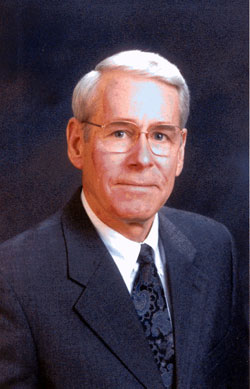1996 Distinguished Lecture Series: David Matlock
David Matlock
Biography
 Dr. Matlock received his B.S. degree in engineering science from the University of Texas at Austin (1968), and his M.S. (1970) and Ph.D. (1972) degrees in materials science and engineering from Stanford University. He is the Armco Foundation Fogarty Professor in the Department of Metallurgical and Materials Engineering at Colorado School of Mines, Golden, Colorado, and Director of the Advanced Steel Processing and Products Research Center, an industry-university cooperative research center at Mines. He joined the Mines faculty in 1972 and is involved in teaching and research, primarily related to the mechanical properties of materials. Specific current research interests include: deformation behavior and formability of high-strength multiphase sheet steels, ferritic stainless steels, and meta-stable austenitic stainless steels; fatigue and fracture behavior of high carbon and carburized bar steels; and fatigue behavior of spot welds in high strength and multiphase sheet steels. Prof. Matlock, a Fellow of both ASM (American Society for Metals) and AWS (American Welding Society), has received numerous awards for teaching and research, including the Robert Lansing Hardy Gold Medal (AIME, 1975), Bradley Stoughton Award (AMS, 1979), Presidential Award for Colorado School of Mines Outstanding Educator (1987), William Sparagen Memorial Membership Award (AWS, 1996), and the Sydney H. Melbourne Award (SAE/AISI 1998).
Dr. Matlock received his B.S. degree in engineering science from the University of Texas at Austin (1968), and his M.S. (1970) and Ph.D. (1972) degrees in materials science and engineering from Stanford University. He is the Armco Foundation Fogarty Professor in the Department of Metallurgical and Materials Engineering at Colorado School of Mines, Golden, Colorado, and Director of the Advanced Steel Processing and Products Research Center, an industry-university cooperative research center at Mines. He joined the Mines faculty in 1972 and is involved in teaching and research, primarily related to the mechanical properties of materials. Specific current research interests include: deformation behavior and formability of high-strength multiphase sheet steels, ferritic stainless steels, and meta-stable austenitic stainless steels; fatigue and fracture behavior of high carbon and carburized bar steels; and fatigue behavior of spot welds in high strength and multiphase sheet steels. Prof. Matlock, a Fellow of both ASM (American Society for Metals) and AWS (American Welding Society), has received numerous awards for teaching and research, including the Robert Lansing Hardy Gold Medal (AIME, 1975), Bradley Stoughton Award (AMS, 1979), Presidential Award for Colorado School of Mines Outstanding Educator (1987), William Sparagen Memorial Membership Award (AWS, 1996), and the Sydney H. Melbourne Award (SAE/AISI 1998).
Abstract
To properly design and utilize engineered structures and systems complete analyses are required. Designs are typically based on computer models and are supported with fundamental understanding of basic engineering principles. Critical to the development of a basis for design is the analysis of previously built structures that have performed successfully as well as those which failed. As evidenced by a significant number of catastrophic failures, the need to properly evaluate past failures remains important to our overall understanding of engineering systems. The concept of “failure” is central to understanding engineering principles. Current computer models must incorporate materials-limited critical conditions and hypothesized failure modes in order to evaluate potential designs and assess the consequences of failure. In this presentation the basics of failure analysis are reviewed and the role of metallurgical engineers is discussed along with a consideration of the requirements to synthesize input from many different disciplines. Basic failure modes are identified. Examples, taken from several recent failures of operating equipment, are discussed to show the interactions of design, material selection, manufacturing methods, maintenance, and inspection on the successful performance of engineering systems.